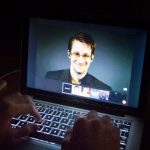Chelsea Manning: Insider Threat document shows US government employees are under surveillance

The US government is busy putting thousands of its own employees under 'permanent surveillance' according to a document obtained by Chelsea Manning. In the wake of leaks by the likes of Edward Snowden and WikiLeaks, the government set up the Insider Threat program in an attempt to nip future leaks in the bud.
It's a while since Manning was in the news, the last notable appearance being when the solider formerly known as Bradley Manning joined Twitter from prison. But the latest document released by Manning -- obtained using a freedom of information request -- shows that the government is not afraid to use NSA-style tactics on its own employees.
Cooperating with the good guys: Is NSA snooping really that bad?

Ever since Edward Snowden, a former US National Security Agency (NSA) contractor, leaked information about the internet spying activities conducted by the NSA, there has been an unrest among Americans. The main concern for most people is that their privacy has been intruded without their permission.
Many Americans are also worried about the things that the NSA and the US administration could do with access to such "private" data. And the revelation about several tech giants, including Yahoo and Google, being involved has probably made people even more circumspect about using online services based in the US.
Fighting censorship: Edward Snowden, Amnesty International, AdBlock and Pussy Riot

Online advertising is incredibly divisive, and for World Day Against Cyber Censorship, AdBlock is opting to replace banner ads that would normally be blocked with links to Amnesty International. The human rights group is fronting an anti-cyber-censorship campaign, joined by Edward Snowden, Pussy Riot (famous for rubbing up Russia's President Putin the wrong way) and Ai Weiwei.
The aim of the campaign is to promote freedom of speech online but highlighting examples of free speech being censored -- not just in obvious places like China and North Korea, but also the United States and the United Kingdom. Government control of the internet is something that many think is restricted to limiting what journalists are able to publish online, but as the campaign highlights it's a problem that can affect anyone.
FBI makes clandestine changes to rules governing access to NSA data

A secret court accepted changes to the rules governing the FBI's access to NSA data about US citizen's international emails and phone activity. The Guardian received confirmation from US officials that the classified changes were made to Section 702 of the Foreign Intelligence Surveillance Act (Fisa).
The Privacy and Civil Liberties Oversight Group (PCLOB) has previously revealed that the FBI was able to search through NSA's collection of trawled data about international communication. The classified nature of the latest changes mean it is impossible to know exactly what they entail, but they are described as being a step towards "enhancing privacy".
GCHQ: US and UK tech firms need to work together to solve encryption challenges

The head of GCHQ, Robert Hannigan, has called for greater co-operation between tech companies and governments. Speaking at the Massachusetts Institute of Technology, Hannigan referred to the "highly charged atmosphere" surrounding the encryption debate in a barely-concealed reference to the on-going battle between Apple and the FBI.
He said that in the coming months Prime Minister David Cameron will set out plans to improve the relationship between tech companies and intelligence agencies. He was at pains to stress that the controversial snooper's charter (or Investigatory Powers Bill) would not be used as an excuse to allow governmental spying or to introduce a ban on end-to-end encryption.
Big Brother's crystal ball: China developing software to monitor citizens and predict terrorist activity

We've become used to the idea of online surveillance thanks to Edward Snowden blowing the lid off the activities of the NSA and GCHQ. While it's easy and natural to bemoan the infringement of privacy such surveillance entails, no one ensures as limited and controlled an internet as the Chinese.
There's the famous Great Firewall of China for starters, and as part of a counter-terrorism program the country also passed a law requiring tech companies to provide access to encryption keys. Now the Communist Party has ordered one of its defense contractors to develop software that uses big data to predict terrorist activity.
EFF pushes forward with new amicus brief in case against NSA spying

At this point it almost feels like we've been living with the Edward Snowden revelations all of our lives. While what was revealed scared many people, it also led to a lot of legal battles that are still raging on. At the forefront of those is the Electronic Frontier Foundation, a group that tirelessly fights for people's rights.
The foundation has had an ongoing case which has been termed Jewell v NSA, as well as Wikimedia v NSA. There are many irons in the fire in this battle and now the EFF has filed a new amicus brief in the Wikimedia case.
Big Brother ist vatching you: Germany poised to use Trojans to spy on internet users

German intelligence agencies are set to gain greater NSA-style surveillance powers after the German Interior Ministry announced plans to use Trojans to spy on the internet activities of suspects. Known as Bundestrojaner, the Trojan would give the government the ability to not only track which sites a target visits, but also record conversations, make use of webcams, access data and log keystrokes.
The Trojan has been in testing since late last year, and having received governmental approval could now be widely dispatched. Widely described as malware and spyware, the tool cannot be used without a court order, but this will do little to assuage the fears of privacy groups.
Court rules it is not illegal for GCHQ to hack computers

Privacy International has lost a court case that questioned the legality of GCHQ's hacking operations. The UK-based privacy and human rights charity launched a legal campaign after Edward Snowden revealed the spying and surveillance that was being carried out by the NSA and GCHQ.
In the course of the case, GCHQ admitted for the first time that it was involved in hacking devices and computers not only in the UK, but around the world. The Investigatory Powers Tribunal (IPT) ruled that activities such as the installation of keyloggers, the remote activation of microphones and cameras, and the use of malware by the intelligence agency is entirely legal.
Julian Assange can't be allowed to hide behind the skirts of WikiLeaks to avoid answering rape allegations

Like Edward Snowden, Julian Assange is an incredibly divisive character. Just as Snowden is viewed by some as a hero for exposing the activities of the NSA, so Assange is viewed as a hero for exposing -- amongst other things -- the darker side of the US military through WikiLeaks. But both figures are also viewed as villains by those who believe that their whistleblowing has endangered national security.
While Snowden scampered off to Russia to avoid the US legal system, Assange took refuge in the Ecuadorian embassy in London. While it's certainly true that he's a man of interest for the US which ultimately seeks to prosecute him over the activities of WikiLeaks, Assange is actually holed up in the UK to escape extradition to Sweden where he faces questioning over allegations of rape. He has continually used the additional prospect of extradition to the US for WikiLeaks-related questioning as an excuse for not facing the music in Sweden. This is just about as wrong as it's possible to be.
The future of the NSA: fight the hackers or embrace the hackers

With its well-known habit of uncompromising surveillance, the NSA has earned itself something of a poor reputation among internet users. But while the spying side of the agency is what it is most famous for, it is actually made up of two different divisions: offensive and defensive.
Later this week the NSA is expected to announce an internal restructuring that will see the two divisions merging. This presents the agency with an interesting predicament: does it continue to work to fight the efforts of hackers, or does it adopt hacker-like techniques to help gather data? Experts says that the merger is a mistake, largely because the aim and modus operandi of the two departments are diametrically opposed.
NSA's lead hacker offers security tips

An interesting talk happened recently during the Usenix Enigma security conference in San Francisco. It was held by Rob Joyce, basically the number one hacker of the US. He is the head of NSA's Tailored Access Operations, or TAO. That's pretty much the government's hacking team, tasked with breaking and entering into the systems of its enemies. Or allies, if need be.
This man, who assumed the position of hacker-in-chief just a few months before Edward Snowden blew the whistle on the whole ordeal, spoke about a lot of things which Wired summed up in one smart sentence -- he explained how to keep people like him out of your systems.
It's all a facade: Encryption may do nothing to reduce surveillance or increase privacy

Living in a technological age where there is a near-fanatical obsession with privacy, a move towards encryption seems to make perfect sense. While there have been calls from some governments to ban encryption and demands for decryption keys to be handed over, there is a drive by companies and online services to try to increase security and privacy with encryption.
But a new report (Don't Panic: Making progress on the encryption debate) from Harvard University's Berkman Center for Internet & Society suggests that encryption may be all but pointless when it comes to curtailing surveillance. While governments and surveillance agencies may balk at the idea of people using encryption to 'go dark' online, and many people embrace the idea as a means of increasing their privacy, the report suggests that the task of surveillance is not going to be made impossible, and could be helped by the Internet of Things (IoT).
The clock is ticking for the US to relinquish control of ICANN

The US is not afraid to throw its weight around; it likes not only to be involved in things, but to be in control. For decades, ICANN (Internet Corporation for Assigned Names and Numbers) -- the non-profit organization that manages IP addresses and domain names -- has been overseen by the US Department of Commerce, much to the chagrin of people around the world. Most upset are those who point to the independent nature of the internet, and the need for any body with global power to be similarly indpendent. Later this year ICANN is set -- at long last -- to completely separate from the US government.
While this does hinge on US government approval, by the end of September, ICANN could instead be in the hands of businesses, individuals, and multiple global governments. While the changing of hands should not alter the way ICANN operates, it is hoped that it will go some way to restoring faith that may have been lost after revelations about online surveillance by the NSA and other US government agencies.
Privacy ombudsman could handle European complaints about US surveillance

The importance and awareness of online privacy issues have been brought into sharp focus in the 21st century. It's not entirely down to Edward Snowden, but the revelations from the former NSA contractor are a constant reference point for those concerned with privacy, security and freedom of speech.
One of the greatest problems facing anyone trying to tackle the problem of privacy on the web is dealing with the ideologies of different countries, and how this affects data sharing. A level of surveillance that is deemed acceptable in the US, for instance, may be considered completely objectionable in another. The latest suggestion to help overcome this seemingly insurmountable problem is to set up a privacy ombudsman that would be able to handle European complaints and queries about US surveillance.
Recent Headlines
Most Commented Stories
BetaNews, your source for breaking tech news, reviews, and in-depth reporting since 1998.
Regional iGaming Content
© 1998-2025 BetaNews, Inc. All Rights Reserved. About Us - Privacy Policy - Cookie Policy - Sitemap.